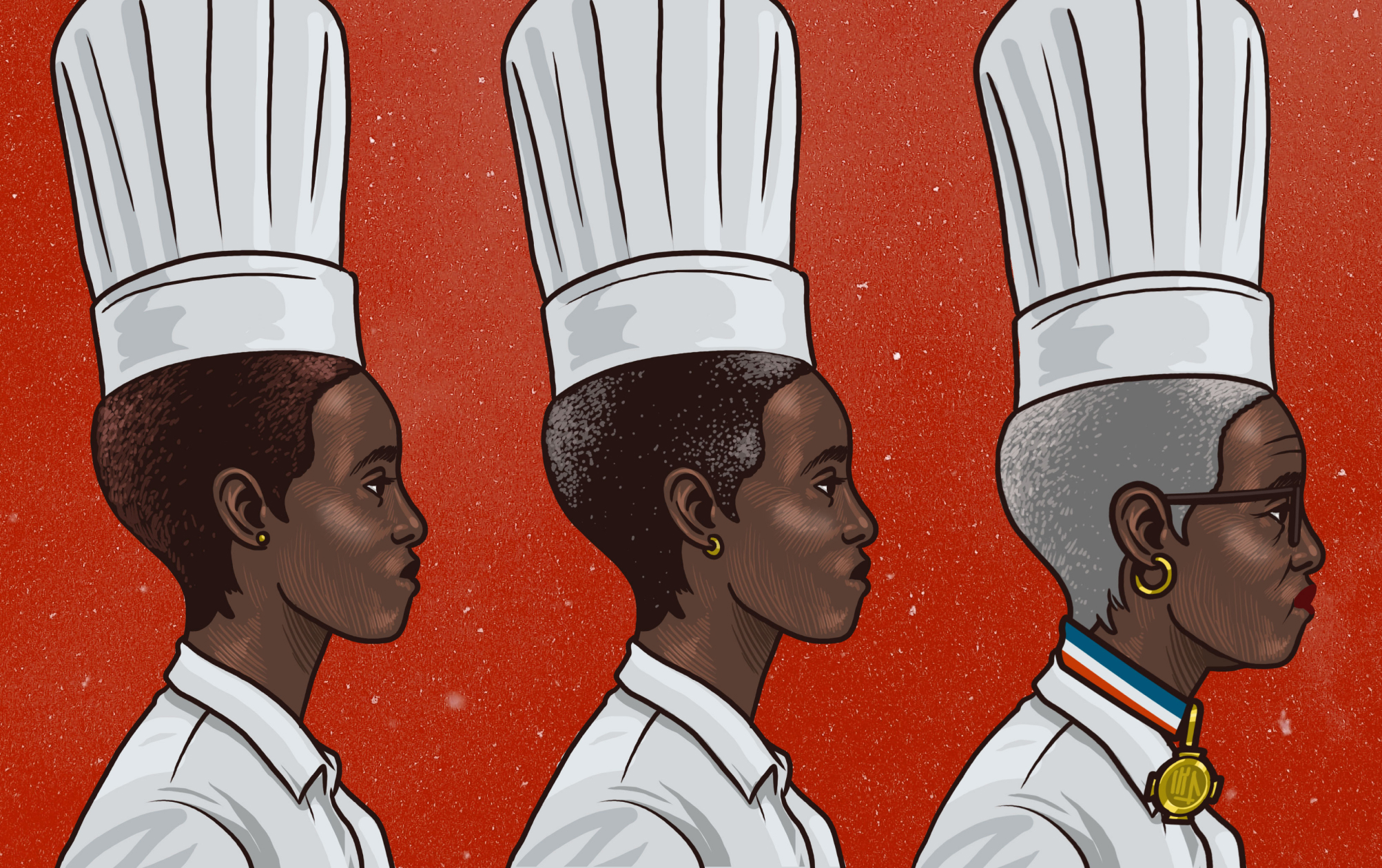Where Are All the Women Chefs?
In 2013, Lucky Peach helped organize our MAD symposium under the theme of “GUTS”. The topics discussed during that two-day event—and later published in a Lucky Peach booklet called GUTS are still as relevant as ever. Every Wednesday until the GUTS run out, we’ll be publishing a feature from the collection. This week, Margot Henderson talks about the female role in the kitchen.
When I was a young chef, I liked nothing better than the creative, steamy, competitive, hard atmosphere of the kitchen. The more shifts, the better; the more there was to do, the better; and I still seemed to have so much energy that I could carry on into the night with my kitchen-mates and still be fresh for the next morning’s work.
For a long time, despite my enthusiasm, I lacked confidence. I spent many years not taking bigger jobs that called for greater responsibility. Finally, one New Year’s Eve, I said, “Come on, Margot,” and I made it my resolution to push myself into the unknown, into a place I knew I could and should be. Because, after all, I was ambitious, and still am.
As soon as I made that resolution, everything fell in line. From that moment on, I have always said, “Yes, you can,” instead of “No, you can’t.” And that first year I went for it, I was given the opportunity to run a kitchen, as head chef at a new restaurant in Notting Hill.
I had no idea what I was doing but I knew that I had to put together a team, and that’s exactly what I did. We all went for it: Peter Gordon, a great force and a calming influence; Catherine Barraclough, who had a gentle touch and her food was always delicious. I read like crazy, a lot of women writers whom I still read and love and cook from: Elizabeth David, Stephanie Alexander, Alice Waters, Mary Sue Milliken. It was inspiring to read about women who were succeeding not only as cookery writers, but as chefs. There were also a few blokes, but I was definitely gravitating to cooks who cooked simply and allowed their ingredients to speak for themselves.
Elizabeth David, along with Marcella Hazan, changed the world of food in Britain. They brought in European regional food and introduced aubergines and haricot beans to a land that was eating sliced white bread. I was very inspired by these women and looked up to them, and they helped me move forward in more ways than I can say.
One day, a few years after starting in Notting Hill, I found this gorgeous, generous man sitting opposite me, and we knew very quickly we were destined to run a restaurant together. I knew he was wonderful and sensed his brilliance with food instantly, so I suggested we open a restaurant. He said, “I don’t know why we hadn’t thought of it before”—we’d known each other about four days—and so it happened that Fergus and I opened the French House Dining Room.
The quails came in and I, being a cook of the eighties, started boning them out. And of course Fergus said, “No, we will cook them whole.” It was a giddy time of love and cooking together. We battled away over the menu but it was a partnership over the stove.
Then Fergus went off to open St. John and I stayed on at the French, and that’s when Fergus and I started having children. Children, as we all know, take your world, your love, and, in my case, they took my food. It took quite a few years once I came away from looking after small children to find my courage again. I am still rebuilding. It’s a little like the Bionic Woman: We can rebuild her. We can make her better than before. She will cook again!
But this time it was even harder, and that got me thinking. I was terrified all the time. At first, my fears seemed to be the normal ones: Am I good enough? Can I prove myself? Can I cook that dish well enough? Will I fuck it up? Will I be screamed at? Will they like it?
Then I began to realize there was another problem. Women don’t need the same courage as men. They need more. They face an extra difficulty. I am always interested in why there are not more women running kitchens—women love to cook! But they aren’t around. They’re missing from our public cuisine. They’re not in charge. They are still the outsiders.
And there’s a reason. This is my theory, and I’m going to risk saying it: there are actually two kinds of cooking. There is a difference between men’s and women’s approaches to food. A really great restaurant is aware of both and finds a way to combine them.
I think it’s ancient. I think it goes right back to the Stone Age. Women produce food; men provide food. In other words, we breast-fed while the men went out and hunted. Both were necessary. We needed both to survive. And both are still in our instincts. Our anatomies decided that.
But today, in the food industry and in the restaurant industry, I think the male approach dominates and the female one is overlooked. In a lot of kitchens, food is treated as a problem to be solved, something to dominate—something that has to give up its secrets. Kitchens are turned into laboratories, filled with tools and weapons: vacuum packers, sous-vides, probes, and all the other stuff. Sometimes the instinctive part gets lost. It almost makes me weep to be told that to confit a duck leg in plastic underwater is just as good as to confit in duck fat.
The loving, nurturing side of the trade, the instinctive side—and, I would say, the feminine side—is being forgotten.
Think of the food industry as a whole. We all know terrible things happen out there—battery farming, genetic modification to allow us to drench crops in pesticides, and so on. The hunter had to go out and make war on nature. When this approach dominates and obscures the other side—working with nature—it leads to disaster. Anyone in their right mind could tell instinctively that feeding rendered, dead sheep to cows wasn’t a good idea. But, oh, no, the money boys and the scientists and the lab rats—they knew best. And in England we had this terrible mad cow crisis and people died.
We need to find a place for the gatherer as well as the hunter.
And that is why I want to ask the question again: Where are all the women chefs?
Melanie Arnold and I have been business partners for nineteen years. There are not many female partnerships like ours in our trade. Why not? Is it because we are too scared, we have been kept out? Do young male chefs not want to listen to us? Or is our approach just out of style?
I can’t help noticing the food that women love: regional, instinctive cooking that is not being celebrated in the top-fifty lists. Where is regional cooking going? It needs to be celebrated. I feel we will lose the old ways—the delicious, simple ways. I worry for all the young men who want to be superstars with a probe in their pocket, and have forgotten what their grannies cooked.
New technology can be great. The male intellectualization of food can be great. But there must be a balance. The kitchen must welcome the gatherers as well as the hunters, and it’s good to be able to acknowledge that some of our most cutting-edge kitchens already do. The foraging movement is part of what I’m talking about, and it’s one part of figuring out how to do this.
Now, I’ve told you what I don’t like. What do I like? What am I passionate about? What I like is when platters are groaning with unctuous flavors. What I like is when things are sticky and oozing, and people are not afraid to gnaw on a bone. What I am passionate about is when food is cooked as a celebration of the uniqueness of the occasion, a coming-together of the season and the location.
I love to celebrate the moment. That moment when there are piles and piles of food whose beauty is natural and simple and time-honored and just waiting to be savored, and not contrived or distorted through tricks and manipulation. I am happiest when the ingredients are allowed to speak for themselves.
Like it or not, women do tend to cook in a different way than men, and the way we respond to food is often different, too. But the aim, the ultimate purpose, is the same: nourishment, eating, the pleasures of being together.




